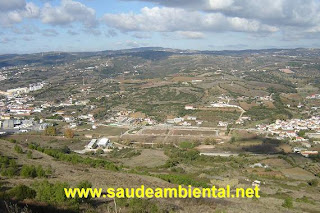
O Arsénio e os valores paramétricos encontrados na água de consumo humano têm sido notícia nos últimos dias.
De acordo com o
Decreto-Lei n.º 243/2001 de 5 de Setembro, que “regula a qualidade da água destinada ao consumo humano e tem por objectivo proteger a saúde humana dos efeitos nocivos resultantes de qualquer contaminação da água destinada ao consumo humano, assegurando a sua salubridade e limpeza”, o valor de referência é de 10 ?g/l
As, não sofrendo, este parâmetro, qualquer alteração decorrente da aplicação do
Decreto-Lei n.º 306/2007 de 27 de Agosto, que irá entrar em vigor no dia 1 de Janeiro de 2008 e que revoga o anterior.
No entanto, a
Organização Mundial de Saúde (OMS) preconiza o limite de 50 de microgramas por litro de arsénio, considerando que este valor acautela a salvaguarda da saúde pública das populações.
A opção tomada no espaço da União Europeia, que culminou com a redução do valor paramétrico, resultou de uma postura preventiva, de grande exigência, e que não foi adoptada noutras regiões do mundo, onde a preservação da saúde pública continua a ser assegurada pelos padrões da OMS.
Sendo assim, estejamos descansados… ou talvez não.
«Quatro de 51 concelhos portugueses ultrapassaram em 2006 o limite legal de Arsénio na água, um metal pesado que um estudo confirma ser um factor de risco de cancro em bebés cujas mães beberam água contaminada durante a gravidez.
Quatro dos 51 concelhos analisados no ano passado pelo Instituto Regulador da Água e Resíduos (IRAR) ultrapassam o limite máximo de arsénio permitido pela lei, segundo o item “Qualidade da Água para Consumo Humano” do Relatório Anual do Sector das Águas e Resíduos.
Em destaque está o concelho de Évora, com um incumprimento de 7,50 por cento nos níveis máximos permitidos de arsénio na água, seguido de Barcelos (5,0 por cento), Vila Franca de Xira (2,86 por cento) e Pombal (1,75 por cento).»
Segundo uma equipa do Instituto Tecnológico de Massachusetts (MIT), os filhos de mães que tenham ingerido, durante a gravidez, água contaminada com arsénio apresentam alterações na expressão de alguns genes que pode, eventualmente, originar mais tarde cancro e outras doenças.
Esta descoberta, publicada na “PLoS Genetics”, é a primeira evidência publicada de alterações em genes originadas por uma exposição pré-natal a um contaminante ambiental.
——————————
Informação recolhida no Portal Ambiente & Saúde e no Jornal Público.







